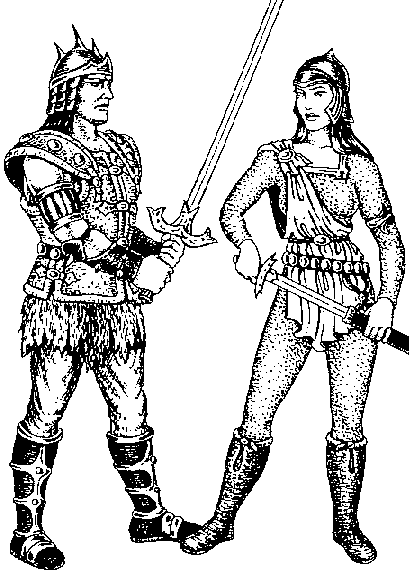 The warrior(ess)
The warrior(ess) The warrior(ess)
The warrior(ess)| "Stand up, thou bastard and
die like a man !" Heavily breathing, sword in her fist, Gala of Wolfsstein
is bending above the pale man, who is cowering on the throne, so that you
may only see the tip of his nose looming out of his hermeline coat. "Knock
him down ! Why do you hesitate ? Every moment we will have to face the
guards !" Gala's fellowship is urging her. "He earns manifold death ! Remember,
how he felled your brother ?"
Gala wipes a bloodstained streak of her hair out of her face. "And, though, I cannot pursue him. For 'tis evil in the eyes of my goddess. What will I say when in the day to come I have to stand before her ? She shall not point her finger at me and say: 'Thou have slaughtered an unarmed man'..." BackgroundWhether as heir to a fief, as an officer in the imperial army or as a fighter for the glory of the divine Lady Rondra, a warrior knows where he finds himself in society.Not every child of a noble may be heir to a noble home: The younger ones will have to get out and seek for their own sake, to fight for land or honour, glory or even only gold. Whosoever wants to claim his own territory by being a warrior has to know how to use a weapon and so many noble sons and daughters will be sent to a warrior academy or as a page to a noble knight during their teenager years. The academies do also teach children from not so noble offspring, if some fencing master takes him to his academy offering him a scholarship. Life is always unforeseeable in its causes. The role of the warrior(ess)No doubt, in a peculiar way a warrior is often "a man for the rude", a reliable friend, whenever a stalwart quarrel is approaching, indispensably waving his blade in dangerous situations. But, to reduce him to a pure striker would do him no good. His virtues are aside of his noble manners and origin also his very good reputation among the ordinary people. Which farmer would want to stand up against a noble man in shining armour ? |
Play your warrior as self-conscient,
however a little arrogant, character, who is used to be commanded or giving
commands. A word is enough. They taught him not only in fencing, hunting
and noble manners, but in being responsible for his deeds. Mastering critical
situations and solving a problem is his greatest wish. The word doubt or
hesitation are not part of his vocabulary.
And all of those warriors are taught in the prayers and rules of the divine Lady Rondra: Honour, pride and pity for the poor and weak. The glory of the goddess is the aim of any action whatsoever that the hero carries out. Of course, the warrior might end up annoying his fellow heroes in some situations: e.g. when he rests upon his decision to stand an open fight against a group of 20 robbers. But do not just stand back and say this is a stupid action: Never forget, Arkania is a continent where courage and honour are still high virtues. Rondra's fellowmen, the warriors will never use poison or attack in any hideous way, from the back or out of the dark. That does not mean, that the reasonable answer always lies in an open contact, but this is a role-playing game and the warrior is not supposed to solve a problem of his own. He is a full of pride and honour and noble courage and he will be indispensable at many times. Quotes"A bold talk, rascal, now let us see whether thy play of blades is equal to your blasphemy...""By our Lady Rondra...!" "This blade will light thy last way to burial ground. Use the short rest of thy life for an honourable prayer..." |